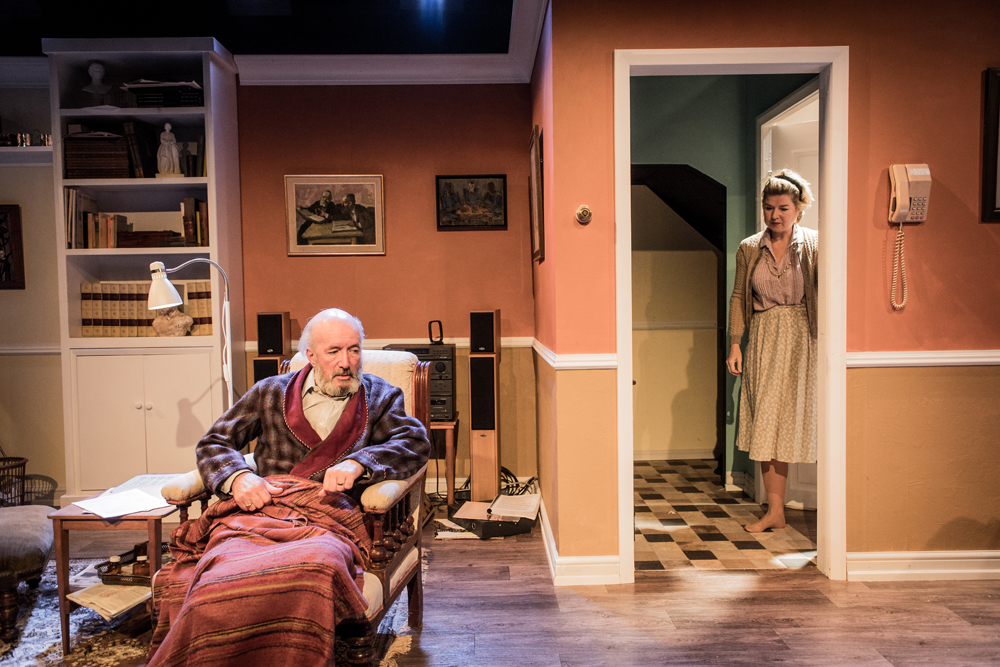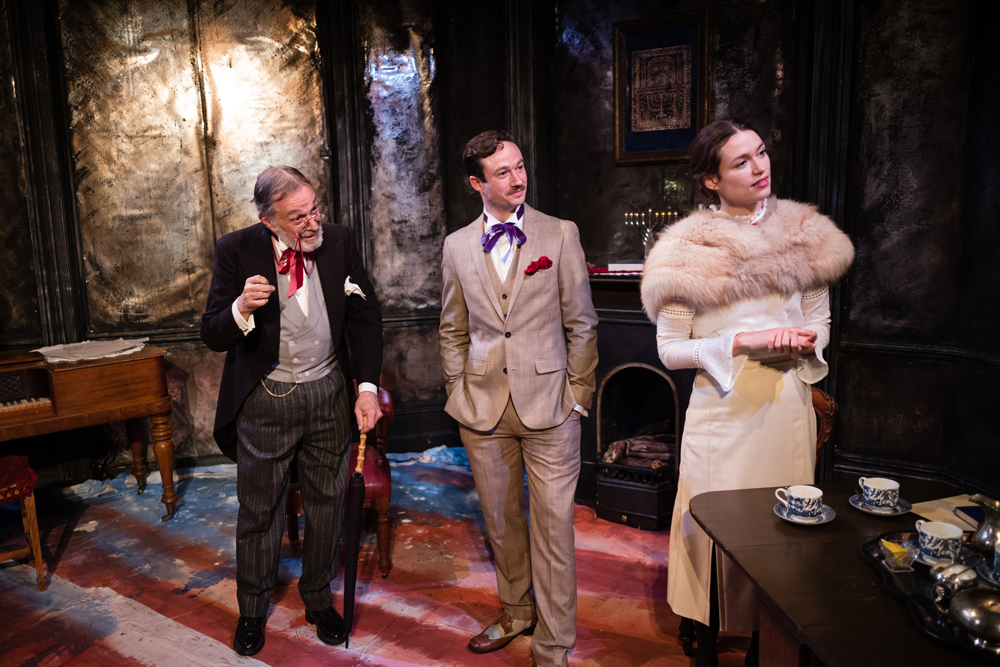Günter Grass's transgressive Peter Pan, refusing to grow up in 20th-century Europe, proves equally disturbing in Kneehigh's new musical. It’s an odyssey through the first half of the 20th century, an unreliable memoir and a very personal state-of-the-(German) nation allegory – and that's just Günter Grass's epic novel. Now Kneehigh Theatre’s powerhouse
Review: The Melting Pot ★★★★ - Israel Zangwill’s clear-eyed 1908 vision proves urgently topical
 Israel Zangwill, a ferociously intelligent, passionate champion of multiculturalism, escaped poverty in London’s East End thanks in part to his education at the Jews' Free School, where he also subsequently taught for a time. He went on to become a writer, political thinker and activist. He was the first to use the phrase ‘the melting pot’ to describe what he also calls ‘God's crucible’ – America – in this play, endorsed enthusiastically and vocally by then US president Theodore Roosevelt at its 1908 premiere in New York. Now Bitter Pill Theatre produces the first UK revival of The Melting Pot since 1938.
Israel Zangwill, a ferociously intelligent, passionate champion of multiculturalism, escaped poverty in London’s East End thanks in part to his education at the Jews' Free School, where he also subsequently taught for a time. He went on to become a writer, political thinker and activist. He was the first to use the phrase ‘the melting pot’ to describe what he also calls ‘God's crucible’ – America – in this play, endorsed enthusiastically and vocally by then US president Theodore Roosevelt at its 1908 premiere in New York. Now Bitter Pill Theatre produces the first UK revival of The Melting Pot since 1938.
David Quixano, the visionary but damaged Jewish composer at the play’s heart, has survived the massacre of his family in the pogroms rife in the Ukraine, to rebuild his life in New York, taking refuge with his Uncle Mendel. Here too he must fight the prejudice and antisemitism displayed by almost everyone, from his uncle’s Irish housekeeper to the brash young millionaire playboy who is his rival in love for philanthropic socialite Vera Revendal. As the estranged daughter of a Jew-hating Ukrainian Baron, she is initially suspicious of Jews herself (‘That wonderful boy a Jew!?’ she exclaims when she finds out).
Vera calls him wonderful because he has played at a fundraising concert for her settlement project to help New York’s poorest. He’s in the throes of writing a symphony – a paean to the melting pot of America, where the prejudices of the past will disappear as the immigrant races mix to create a utopian multicultural future.
How David fights for his principles, his music and his future happiness is the meat of Zangwill’s drama, in director Max Elton’s sprightly, timely revival. It is of course the current rise of antisemitism and the mass movement of refugees from violence and poverty, coupled with prejudice against ‘the other’, that sadly make it so timely.
Steffan Cennydd is a shining-eyed, boyish David Quixano, delivering idealism bound to win Vera’s tender heart, but also convincingly haunted by terrifying flashbacks to the violence he endured. He’s well matched by Whoopie van Raam’s elegant, equally passionate Vera, an appealing young ‘Lady Bountiful’ with a strong sense of justice. Alexander Gatehouse relishes making Quincy Davenport the man you love to hate, a narcissistic, spoilt, insensitive, cheating and unashamedly racist millionaire used to getting his own way, he makes Zangwill seem topically prophetic. He patronises eminent musician Herr Pappelmeister (delightfully authentic Hayward B Morse), calling him ‘Poppy’, and enjoys matching vicious Baron Revendal’s hatred of ‘the Jew vermin’.
Peter Marinker gives intriguing contrasting portraits of Revendal and David’s fiercely Jewish Uncle Mendel – and narrates as Zangwill too. Ann Queensberry valiantly mumbles entirely in Yiddish as Mendel’s mother and Katrina McKeever enjoys housekeeper Kathleen’s journey from despising such Jewish eccentricities as keeping Shabbat, to enthusiastic apologist for her employers’ traditions. Composer Piers Sherwood Roberts knits the action together with tantalising ‘snatches’ from David’s ‘American Symphony’ in this inspiring symphony to multiculturalism.
By Judi Herman
Photos by Chris Tribble
The Melting Pot runs Until Tuesday 19 December. 7.30pm (Sun-Tue), 2pm (Tue only). £18, £16 concs. Finborough Theatre, SW10 9ED. 0844 847 1652. www.finboroughtheatre.co.uk
Click here to hear our interview with Peter Marinker on JR OutLoud.
Review: Young Frankenstein ★★★★ – Mel Brooks doesn't let good taste get in the way of great stage business
Review: The Secret Theatre ★★★★ – Two Elizabethan ages meet at Shakespeare's Globe in a witty, bloodthirsty game of politics
 In the Wanamaker Playhouse’s candlelit space Jon Bausor’s clever set divulges sinister built-in drawers of files. Conspirators plotting treason discover the hard way that a mole is privy to their plans. Religious refugees fleeing to England in the wake of massacres on the continent find themselves unwelcome in isolationist Britain. Late 16th-century London feels a lot like a John le Carré thriller set right now. And indeed playwright Anders Lustgarten owes his title to le Carré, who wrote “espionage is the secret theatre of our society”.
In the Wanamaker Playhouse’s candlelit space Jon Bausor’s clever set divulges sinister built-in drawers of files. Conspirators plotting treason discover the hard way that a mole is privy to their plans. Religious refugees fleeing to England in the wake of massacres on the continent find themselves unwelcome in isolationist Britain. Late 16th-century London feels a lot like a John le Carré thriller set right now. And indeed playwright Anders Lustgarten owes his title to le Carré, who wrote “espionage is the secret theatre of our society”.
Lustgarten comes from Hungarian Jewish ancestry via American immigrant parents who brought him up in Oxford. He began writing plays teaching in prison in America and his political activism has led to his arrest on four continents. He has previously written about the plight of refugees and an earlier play about Italian artist Caravaggio moves between 17th-century Italy and 21st-century Britain, so this seems a logical progression.
At the heart of his web of intrigue is a spymaster who would chill Smiley to the marrow. Aidan McCardle’s Sir Francis Walsingham is as addicted to espionage as a teenager to their smartphone – and how he would have loved the modern technology evoked by the programme cover showing Queen Elizabeth I caught on surveillance cameras! Lustgarten’s dark and witty latter-day revenge melodrama nails the parallels to Russian influence, fake news and post truth.
Lines such as "our relations with Europe being not what they were" elicit knowing audience laughter. Brexit divisiveness is neatly echoed by a Chippenham man evoking the solidarity of Wiltshire men, only to be felled by a Swindon man, who points out the rivalry between the two towns.
Walsingham’s chilling tactics include setting up a stool pigeon caught with a gun in Queen Elizabeth’s private gardens to prove the necessity for his surveillance by catching and killing this ‘would be assassin’ on the spot. So Mary Queen of Scots has no chance of surviving his tactics facilitating the Babington plot that leads to Elizabeth sanctioning her execution.
Tara Fitzgerald’s arresting Elizabeth looks every inch the chalk-faced, frizzy Titian-haired, sumptuously-gowned Queen. It’s only when she opens what proves a foul mouth to berate Walsingham that she seems more shrew than monarch – a fun reversal.
Cassie Layton has a memorable cameo as Mary, her brave exit to the block cut short by a bloodcurdling scream. She is also an eloquent Frances Walsingham, estranged from her father by his machinations that lead to the death in battle of her husband Sir Philip Sidney (appealingly noble Sam Marks).
Our Protestant antihero does reveal to his daughter that witnessing the St Bartholomew ‘s Day Massacre in Paris at first hand as he sought to offer Huguenots refuge from murderous Catholics in the English ambassador’s residence first motivated his machinations.
He may gain some sympathy, though ultimately he loses all in this game of thrones. But it’s an exhilarating, if bloody, game while it’s afoot in Matthew Dunster’s fast-moving production.
By Judi Herman
Photos by Marc Brenner
The Secret Theatre runs until Saturday 16 December. 7.30pm (Tue-Sat), 6.30pm (Sun only), 1pm & 2pm (days vary). £10-£62. Shakespeare's Globe, SE1 9DT. www.shakespearesglobe.com
Review: Mother Courage and Her Children ★★★ - The mother of all anti-war plays proves a survivor thanks to Josie Lawrence’s damaged Mother
 Brecht’s meditation on war usually gets the loud, raucous in-yer-face treatment from directors. Hannah Chissick’s production of Tony Kushner’s urgent translation, which has an all too contemporary resonance as refugees flee wars across continents, is no exception. Yet Josie Lawrence’s Courage finds moments of quiet – albeit quiet desperation – which are much needed breathers on the gruelling journey through 30 years of war across a ravaged Europe. The desperation is for her children’s plight. She is always the conflicted mother as well as the often unscrupulous wheeler dealer – forced to pay a terrible price to survive, even thrive in the theatre of war. And though she is palpably grungy, Lawrence’s Courage is also younger and sexier than I have seen before, an attractive catch for the Chaplain and the Cook (convincing David Shelley and Ben Fox), who hitch lifts on her supply wagon across those battlefields.
Brecht’s meditation on war usually gets the loud, raucous in-yer-face treatment from directors. Hannah Chissick’s production of Tony Kushner’s urgent translation, which has an all too contemporary resonance as refugees flee wars across continents, is no exception. Yet Josie Lawrence’s Courage finds moments of quiet – albeit quiet desperation – which are much needed breathers on the gruelling journey through 30 years of war across a ravaged Europe. The desperation is for her children’s plight. She is always the conflicted mother as well as the often unscrupulous wheeler dealer – forced to pay a terrible price to survive, even thrive in the theatre of war. And though she is palpably grungy, Lawrence’s Courage is also younger and sexier than I have seen before, an attractive catch for the Chaplain and the Cook (convincing David Shelley and Ben Fox), who hitch lifts on her supply wagon across those battlefields.
This is a religious war, Catholic versus Protestant in a bloody conflagration where the likes of Courage must be quick on their feet to change sides and hoist the right flag when the advantage shifts from one side to the other.
Right up front Brecht/Kushner play devil’s advocate to make a case for the business of war, putting the arguments in the mouths of army recruiting officers, notably that of striking Celeste de Veazey in Chissick’s gender-blind cast. Women make a strong impression throughout, from Laura Checkley’s blowsy woman-in-red Yvette to Phoebe Vigor, mesmerising then heart-breaking as Courage’s dumb, disfigured daughter Kattrin.
There’s useful support from Julian Moore-Cook and Jake Phillips Head as Courage’s sons, honest, simple Swiss Cheese and tougher, less scrupulous Eilif (a chip off the old block). The production’s main drawback is Barney George’s set. The traverse staging looks promising as you enter the auditorium, but when you realise that there is a theatre-long platform behind one half of the seating, which means half the audience has to turn round and risk neck injuries to see action set there (or simply give up and treat it as radio, as I was reduced to doing), the play becomes alienating in a way that Brecht would not have appreciated. It’s especially galling when the cast sing and play Duke Special’s evocative folk music behind you.
Chissick’s direction also proves surprisingly static, Courage’s wagon, adorned with makeshift awnings and barrels, occasionally gets lugged across the floor. When she moves it at the climax though, Lawrence herself is genuinely moving, recruiting audience assistance. I've survived some thrilling epic productions (notably another meditation on war, Peter Brook's unforgettable nine-hour Mahabharata). But here, with a running time of three hours (the programme, presumably printed earlier, has two hours thirty), the war has rather taken its toll by then.
By Judi Herman
Photos by Scott Rylander
Mother Courage and Her Children runs until Saturday 9 December. 7.30pm (Mon-Sat), 3pm (Tue & Sat only). £12-£20. Southwark Playhouse, SE1 6BD. 020 7407 0234. www.southwarkplayhouse.co.uk
Review: Imagine This ★★★ - Brave revival of a musical celebrating courage in the face of persecution across two millennia
 Imagine yourself imprisoned in the Warsaw Ghetto, 1942, facing the dilemma of whether or not to stand up to your Nazi persecutors. You are one of a company of Jewish actors confined there, determined to stage a play about the siege of Masada in 66BC. The siege ended in the mass suicide of the Jews defending the mountain fortress as the Roman besiegers stormed it, so it has long been a symbol of valiant Jewish resistance to persecution. A poem telling this story is said to have inspired the Warsaw uprising, and it’s upon this premise that Shuki Levy (music), David Goldsmith (lyrics) and Glenn Berenbeim (book) based this valiant musical attempt to bring the two uprisings together. Sasha Regan’s award-winning Union Theatre has a fine track record of small-scale musical revivals and it certainly succeeds better than the full-blown 2008 New London Theatre premiere.
Imagine yourself imprisoned in the Warsaw Ghetto, 1942, facing the dilemma of whether or not to stand up to your Nazi persecutors. You are one of a company of Jewish actors confined there, determined to stage a play about the siege of Masada in 66BC. The siege ended in the mass suicide of the Jews defending the mountain fortress as the Roman besiegers stormed it, so it has long been a symbol of valiant Jewish resistance to persecution. A poem telling this story is said to have inspired the Warsaw uprising, and it’s upon this premise that Shuki Levy (music), David Goldsmith (lyrics) and Glenn Berenbeim (book) based this valiant musical attempt to bring the two uprisings together. Sasha Regan’s award-winning Union Theatre has a fine track record of small-scale musical revivals and it certainly succeeds better than the full-blown 2008 New London Theatre premiere.
A Jewish theatre company confined in the Warsaw Ghetto performs a play about the Jews of Jerusalem retreating to Masada, drawing the obvious parallel between their Nazi oppressors and the Roman invaders. Their director Daniel manages to sell this subversive show to Nazi Captain Blick: “It’s got singing, dancing and all the Jews die in the end”. He even manages to hide Adam, a fugitive resistance fighter from the Nazis (Shaun McCourt), by casting him as the humane Roman commander who falls in love with Tamar, daughter of the Jewish leader (Lauren James Ray). Of course Adam falls for Rebecca, Daniel's daughter playing Tamar. And then the Jewish actors face an impossible dilemma, as Adam reveals the truth of the concentration camps…
Levy’s music can be attractive (the opening number recalling ‘The Last Day of Summer’ before the 1939 invasion of Poland, is a wistful earworm. The title song is a great vehicle for Nick Wyschna’s Daniel, keeping his company together against the odds and Wyshna himself is the vital heart of the production. The grim determination expressed in the defiant number Masada, though, becomes an unwelcome earworm, not least because it recurs once too often. Many numbers are simply too long, though all are beautifully played by the hard-working quartet of musicians (piano, fiddle, bass and drums), unaccountably not credited in the programme, apart from MD Alex Williams and musical supervisor Lee Freeman.
The 17-strong company work tirelessly in their roles both as Jews and Nazis and Jews and Romans. Kevan Allen’s choreography is a stunning example of what you can achieve on a simple set. Justin Williams’ multi-levelled platform makes a useful Masada and his terrific collection of crates make useful levels for that dynamic choreography. Harry Blumenau marshals his cast with verve and they tell the story with empathy and passion – and best of all, without microphones.
By Judi Herman
Photos by Nick Brittain
Imagine This runs until Saturday 18 November. 7.30pm (Tue-Sat), 2.30pm (Sat & Sun only). £25, £22.50 concs. Union Theatre, SE1 0LR. www.uniontheatre.biz
Review: Pinocchio ★★★★ - Israeli-born choreographer Jasmin Vardimon and her company create breath-taking stage pictures to enchant
If you want to introduce your child to the magic of live theatre, then the captivating combination of physical dance theatre and brilliantly imaginative staging with which Yasmin Vardimon and her company weave the story of Pinocchio should leave any theatregoer, new or experienced, eager for more.
Vardimon has an extraordinary imagination and with her collaborators, set designer and dramaturg Guy Bar-Amotz and lighting designer Chahine Yavroyan, she finds a fresh way of conjuring each scene in Collodi’s story of the wooden puppet boy who yearns to be a real boy. Perhaps the most distinctive signature of her style is the stunning and seamless way her eight performers work together to use their bodies – or often just one body part each – to create a whole.
Working together with precise discipline, three performers open the show by assembling the disturbing, dark, squat figure of the narrator (perhaps the Cricket) from their gloved hands. Meanwhile, within a brightly-lit conical tent, shadow-play creates the illusion of puppet-maker Gepetto fashioning the life-size puppet from his magical piece of wood. The Blue Fairy materialises and floats effortlessly upwards as the tent morphs into her gown, all blue light.
In Geppetto’s workshop all eight dancers revolve around as figures in a clockwork musical box, each face a smiling mask, each body moving as precisely as clockwork as they rise in turn to the centre of their mechanical frieze, like paper cut-out dolls. Even the performers’ feet create ‘puppets’ and many hands make light work of Pinocchio’s nose.
The episodic nature of Pinocchio’s journey lends itself perfectly to this problem-solving teamwork. But of course the heart (beating rather than wooden) of the story is Pinocchio himself. Maria Doulgeri brings extraordinary physicality to the role, limbs revolving stiffly at first as if her joints are indeed awkwardly jointed with pins; flailing wildly and unnaturally to the scornful amusement of the nasty children in a playground who revel in excluding the little outsider; and gradually softening as he achieves empathy and selflessness – and so humanity.
The shape-shifting cast is uniformly excellent, equally at home as animals, puppet or humans, on the ground or in the air – or suspended on puppet strings. Scheming cat and fox are present and correct and banish any memories you may have of that Disney film.
The evocative music ranges from Shostakovitch to Beyoncé via accordion music from the Faroe Islands and the vocalising sighs and gasps from the cast add to the inclusive atmosphere. If some scenes are a tad long, the whole, at 90 minutes is just right. And it’s testimony to the show that despite there being no interval its young audience was spellbound throughout.
By Judi Herman
Pinocchio runs Friday 3 & Saturday 4 November. 7.30pm, 2pm (Sat only). £13, £8.50. Grand Theatre, Blackpool, FY1 1HT. www.blackpoolgrand.co.uk
Review: Young Marx ★★★★ - On your Marx for an exhilarating chase through 19th-century Soho (in 21st-century comfort)
 Welcome to 1850 – a genuine welcome to political refugees from Europe, including 32-year-old Karl Marx. But is he in danger of outstaying his welcome as he goes on the razzle through Soho, funding his pub crawls by trying to pawn the family silver? His wife’s family that is, for Jenny von Westphalen is of aristocratic German stock, her relatives scandalised by her marriage to the penniless Jewish revolutionary. As young Marx himself puts it “at our wedding I was only invited to the reception”.
Welcome to 1850 – a genuine welcome to political refugees from Europe, including 32-year-old Karl Marx. But is he in danger of outstaying his welcome as he goes on the razzle through Soho, funding his pub crawls by trying to pawn the family silver? His wife’s family that is, for Jenny von Westphalen is of aristocratic German stock, her relatives scandalised by her marriage to the penniless Jewish revolutionary. As young Marx himself puts it “at our wedding I was only invited to the reception”.
This is one of many knowing one liners from the collaboration of Richard Bean (of One Man, Two Guv’nors fame) with witty barrister/radio writer Clive Coleman. Their young Marx is a full-blooded “solipsistic, self-regarding prick”, in the words of his often exasperated, though always devoted sidekick Engels. They write Marx and Engels as a sort of early music-hall double act and Rory Kinnear and Oliver Chris are perfectly cast.
Kinnear’s Marx, hair and beard wild and out of control as his behaviour, is in the throes of writer’s – and thinker’s – block. He achieves the vital balance between infuriating as the reprobate hiding in cupboards when creditors come calling, and earning sympathy as the adoring father, anxiously tending his sickly son and listening proudly to his daughter’s prowess at the piano (before the broker’s men take it, along with the rest of the family’s furniture and clothes).
Chris’s Engels, equal parts admiration and frustration, convinces as the man whose unwavering self-sacrifice will lead to years of financing Marx’s project (and keeping his family going) by slipping him cash from the till of his father’s Manchester textile factory. In Chris’s performance, he is the vital moral heart of the play too; you can believe that he wrote passionately about the plight of workers observed first hand in those factories.
For all this is fact, Bean and Coleman have mined a rich seam of eyebrow-raising biographical detail and transmuted it into precious theatrical mettle (pun intended!).
They create a vibrant messy Victorian London, peopled by rival factions of émigré activists, German spies – and ‘peelers’. Our odd couple’s run in with one of Sir Robert Peel’s prototype policemen is an ‘arresting’ example of the writers’ anachronistic, self-referential wit. The drunken pair, caught in possession of a wrought-iron church gate, are surprised and grateful to avoid a beating. “I’ve been on a course” explains the officer.
Big set-pieces – a political meeting, a dawn duel on Hampstead Heath and best of all a deliciously transgressive brawl in the British Museum reading room – contrast nicely with these cameos and with the intimate family scenes cramped into the two tiny rooms where Marx lives with wife, children, and housekeeper Nym. Nancy Carroll is magnificent as passionate, put-upon Jenny and Laura Elphinstone’s quiet hard-working Nym, whose devotion to Marx ultimately gets physical, matches Carroll as Chris matches Kinnear.
Nick Hytner directs a uniformly superlative cast with wit, sensitivity and pace on Mark Thompson’s fold-out set in London greys and browns, lit by Mark Henderson’s atmospheric lighting and topped by Soho rooftops and chimneys, among which Marx climbs to evade the law, which still look much the same today.
It’s a terrific demonstration of the versatility of Hytner and project partner Nick Starr’s brand new Bridge Theatre and augurs well for future productions. Julius Caesar, complete with audience promenaders as the Roman mob, is up next in January. As befits this democratic vibe, seat prices start at £15 and the horse-shoe shaped, spacious auditorium is inclusive, with sightlines looking uniformly good and seats are especially comfortable. The whole is completed in golden leather and wood, and if there is currently a bit of a flow problem because the single doors to the auditorium are too narrow, this could be corrected. The public spaces are spacious, well-lit and welcoming – and ladies, you will be, er, relieved to find so many toilet cubicles with your name on them.
By Judi Herman
Photos by Manuel Harlan
Young Marx runs until Sunday 31 December. 7.45pm (Tue-Sat), 2.30pm (Wed & Sat), 3pm (Sun only). £15-£65. Bridge Theatre, SE1 2SG. https://bridgetheatre.co.uk
Also broadcast live to 700 UK cinemas and many more worldwide on Thursday 7 December. Visit www.ntlive.com for further details.
Review: Anything That Flies ★★★ - Soaring performances bring home a poignant message
 I won’t reveal why novelist Judith Burnley gives her moving debut play this intriguing title. To find out, you’ll have to get to know Otto and Lottie, he a Holocaust survivor and she an aristocratic German with her own story of devastating wartime trauma. Otto’s viola-playing days may be over, as he is also a stroke survivor, but he has the consolation of listening to Brahms on state-of-the-art speakers he designed himself!
I won’t reveal why novelist Judith Burnley gives her moving debut play this intriguing title. To find out, you’ll have to get to know Otto and Lottie, he a Holocaust survivor and she an aristocratic German with her own story of devastating wartime trauma. Otto’s viola-playing days may be over, as he is also a stroke survivor, but he has the consolation of listening to Brahms on state-of-the-art speakers he designed himself!
It’s 1991, so 46 years since the war and two years after the Berlin Wall fell. The latter has repercussions for both; the former changed their lives forever. Escaping Germany in time meant Otto suffered further displacement, interned on the Isle of Man, only to discover the fate of his family once the war was over. Lottie’s father was hanged (‘with piano wire’) for his part in a plot to kill Hitler, and after the war she herself fled life under Communism as Germany was divided.
All this comes out as the unlikely pair size each other up once the life force that is Lottie bursts into Otto’s Belsize Park flat, apparently sent to care for him by his daughter. Lottie explains they met in Israel, where Otto’s daughter now lives and where Lottie’s Israeli partner has just died. Daughter Erika wins him over by describing the traditional Mittel Europa dishes that are Lottie’s cooking credentials – of course it’s Otto we hear reciting, increasingly orgasmically, “Rostbraten? Schnitzel? Sauerbraten?” It’s a hilarious one-sided phone conversation, one of the more successful of a series of such phone chats that stud the action.
Lottie soon discovers Otto has other ways of attempting to reach orgasm – he is in short a transgressive randy old goat, so that by the time he has called Lottie a Nazi and a German shiksa (Yiddish for a non-Jewish whore), your sympathies are with her. And as much as he loves the dishes of his childhood, he despises that icon of Englishness, Christopher Robin. It’s his contemptuous dismissal of her recitations that leads Lottie to reveal that the great love of her life was the English nanny who introduced her to AA Milne.
Nonetheless the pair bond over their love of the English language. For him it means a yearning to fit in, to be part of the country where he’s made a new life, but nonetheless feels like an outsider: “Beneath the politeness … a dirty Jew.” For her it’s her concept that English children played poo sticks as “German children were being conscripted into Hitler’s Youth League."
This is one of the best scenes in a timely play that poignantly explores what it is to be an outsider – reminding contemporary audiences what the refugees of the last century underwent as the asylum seekers of the 21st century strive to make new lives. Clive Merrison and Issy van Randwyck are pitch perfect in this two-handed performance.
By Judi Herman
Anything That Flies runs until Saturday 11 November. 7.30pm (Mon-Sat), 3.30pm (Sat only). From £15. Jermyn Street Theatre, SW1Y 6ST. www.jermynstreettheatre.co.uk
Review: The Toxic Avenger the Musical ★★★★ - This grungy green giant is on message loud and clear
Producer Katy Lipson (Aria Entertainment) has a sure eye – and ear – for a hit musical. Between a summer of new musical theatre at The Other Palace, including Some Lovers, Burt Bacharach’s first for years, and the imminent autumn transfer of a sell-out immersive version of tribal rock musical Hair arriving at London’s Vaults from Manchester’s Hope Mills Theatre, comes this West End transfer of a musical that had a hugely successful first outing at Southwark Playhouse.
It isn’t the first high-camp schlock horror movie to make it from screen to stage, though it may be the weirdest (and loudest). Like soulmate Little Shop of Horrors, it’s based on a movie with a musical score added here by David Bryan (yes, Bon Jovi’s keyboardist David Bryan Rashbaum!). In place of the film’s comic-book biffs and bangs – enough to employ an army of Foley artists and stunt-persons – Joe DiPietro’s adaptation of Lloyd Kaufman’s (with Joe Ritter) bracingly violent screenplay has Benji Sperring’s fast-moving, out and loud, in-yer-face direction; designer takis’ versatile three-tier set, incorporating huge vats, library, beauty salon and much more; a loud and lovely five-piece band led by musical Wunderkind Alex Beetschen – and just five extraordinary triple threats playing a cast of (almost) thousands.
In fictional New Jersey town Tromaville, the dastardly Mayor ruthlessly exploits local resources, dumps waste like there’s no tomorrow and is behind local crime syndicates. Meanwhile puny weakling Melvyn is bullied mercilessly until his tormentors crown their violence by throwing him into a vat of toxic waste, transforming him into the (admittedly hideous) superhero Toxic Avenger – green in colour and credentials – sworn to cleanse Tromaville of waste and bullies, including the Mayor; and soon, beloved of pretty, blind librarian Sarah, who ‘sees’ him not exactly for what he is, as she’s convinced ‘Toxie’ is an exotic French name.
Where the film split Melvin/Toxie between two actors, Mark Anderson curls up as Melvin and more than mans up for Toxie. Natalie Hope achieves a spectacular double as sexually predatory, vampish Mayor, her shocking pink décolletage an offensive weapon (the film has a man in suit!), with lightning changes into Melvin’s Mum in hairnet and housecoat – even actually duetting with herself! Ché Francis’ ‘Black Dude’ and Oscar Conlon-Morrey’s ‘White Dude’ morph miraculously into multiple pairs of thugs, henchmen, cops and hilariously, girlfriends. Emma Salvo just gets to be plucky Sarah, in mismatched pop socks, and constantly mislaying her white cane – she really goes for the gleefully politically incorrect, definitely ‘blind’ rather than ‘visually impaired’. All five and their hard-working swing/understudies, Sophia Lewis and Peter Bindloss, have huge, true voices to carry Bryan’s witty (and mostly audible) lyrics. An intoxicatingly tasty – and tasteless – treat.
By Judi Herman
Photos by Irina Chira
The Toxic Avenger the Musical runs until Sunday 3 December. 7.30pm (Tue-Sat; exc. 3 Oct), 3.30pm (Sat only), 3pm & 6.30pm (Sun only). £19.50-£59.50. Arts Theatre, WC2HL 7JB. www.toxicavengermusical.co.uk













